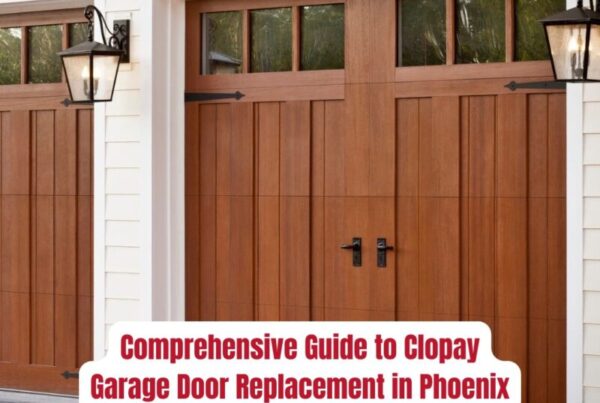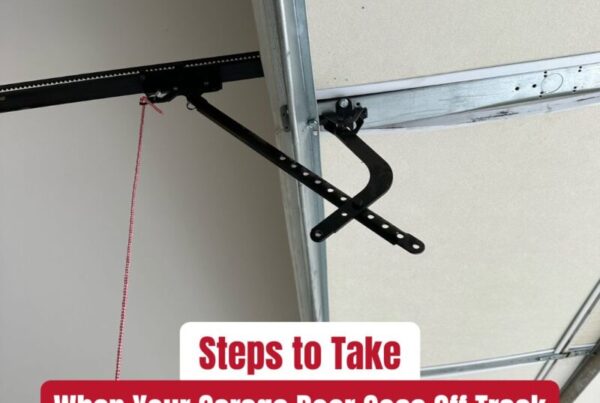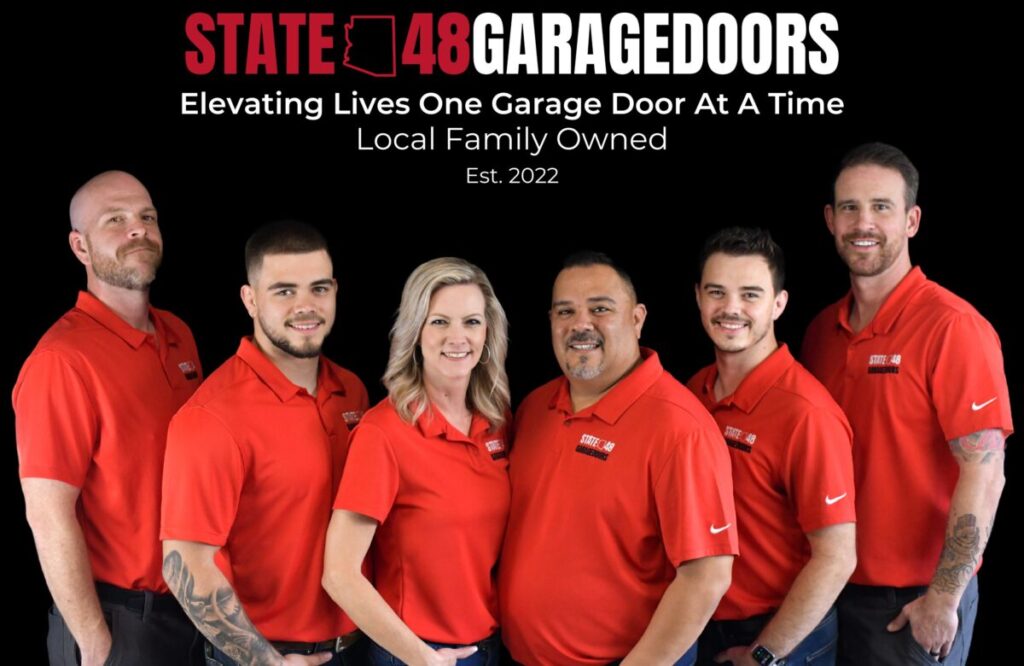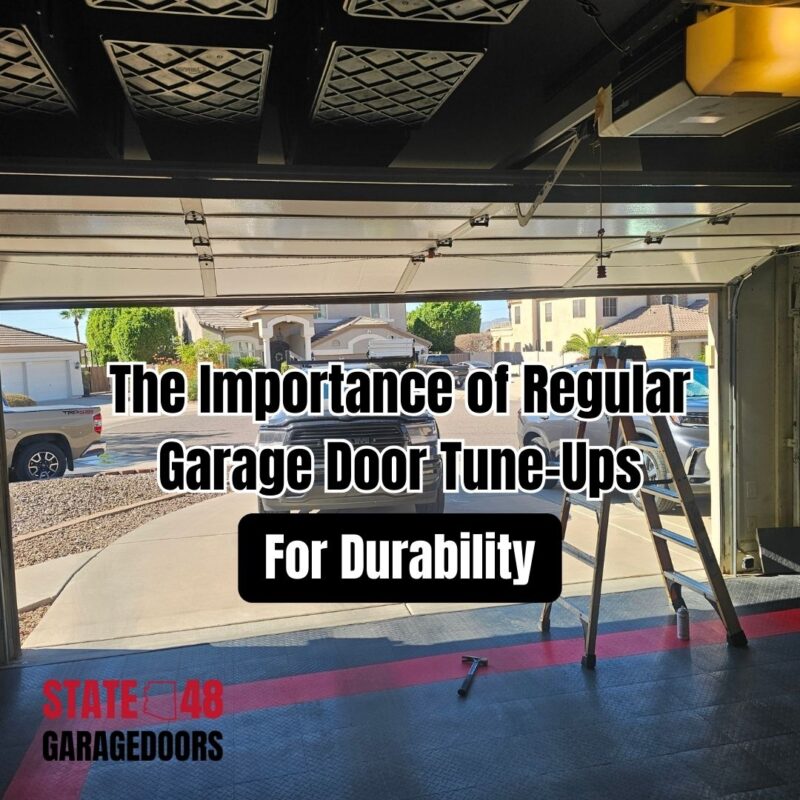
The Benefits of Regular Garage Door Tune-Ups
Regular garage door tune-ups are the secret to extending the life of your overhead door. They ensure smooth operation and help avoid unexpected breakdowns. Homeowners in the Phoenix metropolitan area often rely on garage door repair Phoenix services. They know that a well-maintained door boosts curb appeal, improves safety, and saves money over time.
As a certified garage door technician, I can confirm the value of routine inspections, lubrication, and adjustments. These steps prevent wear and tear, reduce noise, and lower the risk of costly repairs. Whether your door is made of steel, wood, or glass, consistent maintenance helps fight corrosion, rust, and friction.
Investing in periodic tune-ups leads to higher customer satisfaction. It also extends the life of your door by maintaining proper tension and easing stress on key parts like torsion springs and weatherstripping. Maintenance also protects your door from harsh weather conditions.
This guide will explain the benefits of regular maintenance, outline the tune-up process, and share helpful tips. Let’s explore how tune-ups help you save money, avoid emergency repairs, and keep your home secure.
Extend the Lifespan of Your Garage Door Through Consistent Garage DoorMaintenance
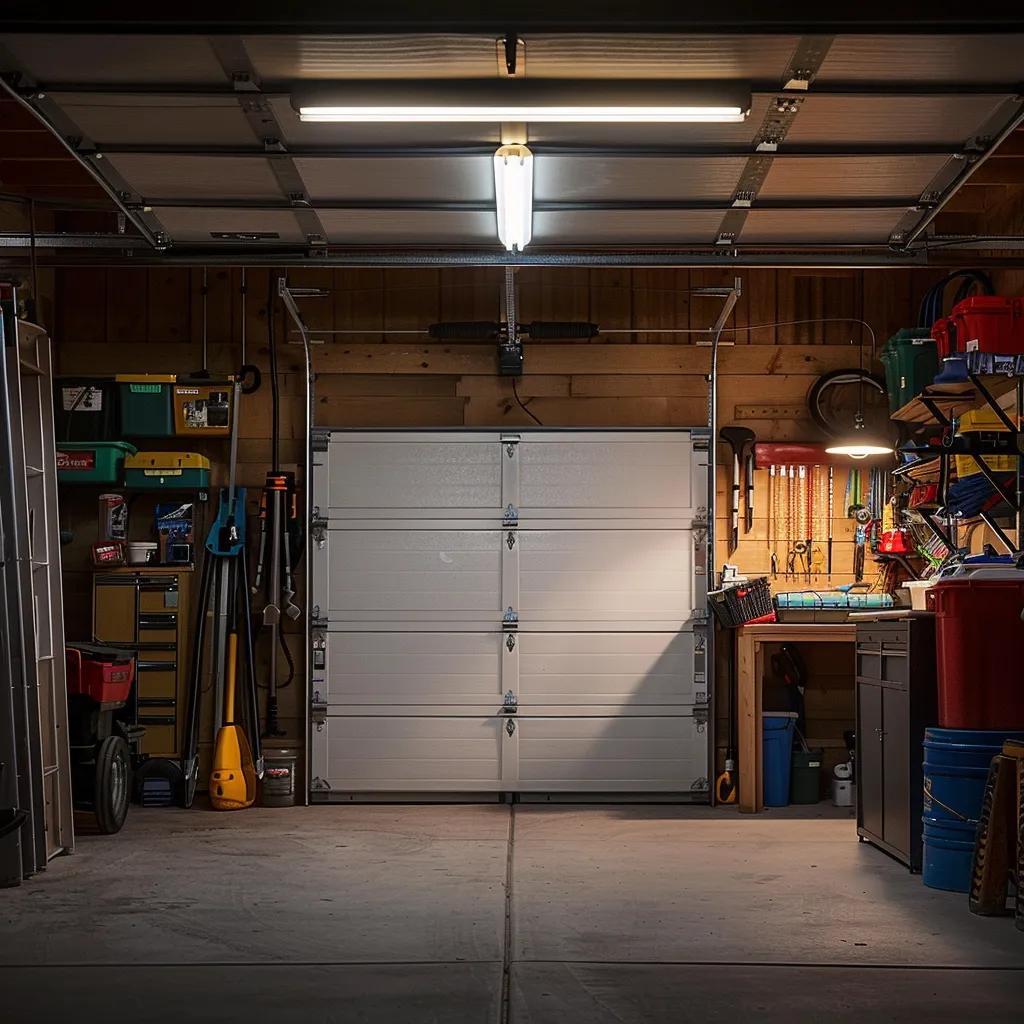
Regular maintenance is crucial for preventing premature wear and tear, ensuring that your door operates reliably and safely every day. In this section, we discuss how preventive maintenance helps preserve critical components, avoid emergency repairs, and protect your significant investment.
Prevent Premature Wear and Tear on Critical Components
Regular tune-ups keep every moving part of your garage door—from rollers and springs to cables and sensors—in top condition. Daily use, weather, and friction cause components like nylon bushings and torsion springs to degrade over time. By addressing these issues early, you prevent expensive breakdowns that can lead to misalignment or total door failure. For instance, if a spring loses tension due to long-term wear, the door may become unbalanced, forcing the motor to work harder and ultimately reducing its lifespan. Studies have shown that preventative care can extend a door’s operational life by up to 40% (Smith, 2020, link). Routine maintenance also ensures that parts like hinges and bearings are free from rust and corrosion. This is particularly important in the Phoenix metropolitan area, where extreme temperatures and dust can accelerate deterioration. Using quality tools such as a socket wrench, lubricants, and cleaning detergents can ensure efficient repairs and minimize downtime. When your garage door is well-maintained, you not only save money on emergency repairs but also avoid the hassle of daytime service calls that might disrupt your schedule.
Address Minor Issues Before They Escalate Into Major Problems
A small issue like a loose screw or frayed cable might seem minor, but if ignored, it can lead to major problems—such as system failure. Regular garage door service helps technicians catch signs of wear or damage early. By tightening bolts, replacing worn parts, or adjusting the door’s balance, they stop minor faults from becoming safety hazards.
Research shows that early intervention can cut repair costs by up to 35% (Jones, 2021, link). Addressing issues early also extends the life of your overhead door. It reduces risks like injury or property damage caused by a malfunctioning system.
Minor issues can also cause noise, vibration, or erratic movement. A thorough tune-up resolves these problems and keeps your door running smoothly. These proactive steps ensure peak performance, long-term reliability, and better home security.
Maintain Optimal Performance With Routine Garage Door Service
Keeping your garage door in top working condition means that it will operate smoothly every time it’s used. Over time, everyday use can lead to misalignment of components, uneven wear, and degradation in performance. Routine tune-ups involve precise adjustments that restore the door’s original balance and performance.
For example, recalibrating the door sensors and adjusting the auto-reverse mechanism help the door respond correctly during opening and closing. These regular services lower the risk of malfunctions, helping prevent accidents and improve overall safety.
When your garage door performs optimally, it also reduces friction and eases the strain on the drive motor. A balanced door uses less energy, which can help lower utility bills—an advantage for budget-conscious homeowners.
In hot climates like Phoenix, intense heat and temperature swings can stress mechanical parts. Preventive maintenance becomes even more important in these areas to avoid rapid wear and unexpected repairs.
How Regular Lubrication Contributes to Longevity
Lubrication is an essential component of any mechanical system, and your garage door is no exception.
Over time, metal parts like rollers, hinges, and springs build up friction. This causes added stress, leads to metal wear, and produces excessive noise.
During a routine tune-up, technicians apply high-quality grease or lubricant to minimize that friction. This simple step helps prevent rust and corrosion.
Proper lubrication allows components to move smoothly and maintain correct tension. That balance is crucial for the door’s overall performance and safety.
It also ensures that safety features—like the auto-reverse mechanism—work properly when something blocks the door’s path.
Using a specialized garage door lubricant can extend the life of parts, reducing the need for replacements. Over time, this saves money on both materials and labor.
Lubricated parts also run more quietly, creating a better experience for the homeowner and boosting overall satisfaction.
The Impact of Weather Exposure and How Maintenance Can Help
Garage doors are exposed to the elements every day. Weather conditions like extreme heat, heavy rain, high winds, and dust can aggressively wear down even the most robust materials.
Prolonged sun exposure can cause paint to fade and metal parts to weaken, while moisture often leads to rust on steel components. Regular garage door tune-ups include thorough cleaning and protective treatments to combat these environmental effects. During service, technicians inspect weatherstripping and seals to prevent moisture from reaching the door’s sensitive internal mechanisms. This weatherproofing is especially vital in places like Phoenix, where intense sunlight and frequent dust storms can quickly degrade garage door parts. Proactive maintenance preserves both the door’s appearance and mechanical integrity. By addressing weather-related issues early, homeowners reduce emergency repairs, improve performance, and maintain long-term efficiency—making it a smart choice for protecting their home and managing costs.
Improve Safety and Security With Proactive Garage Door Tune Up Services
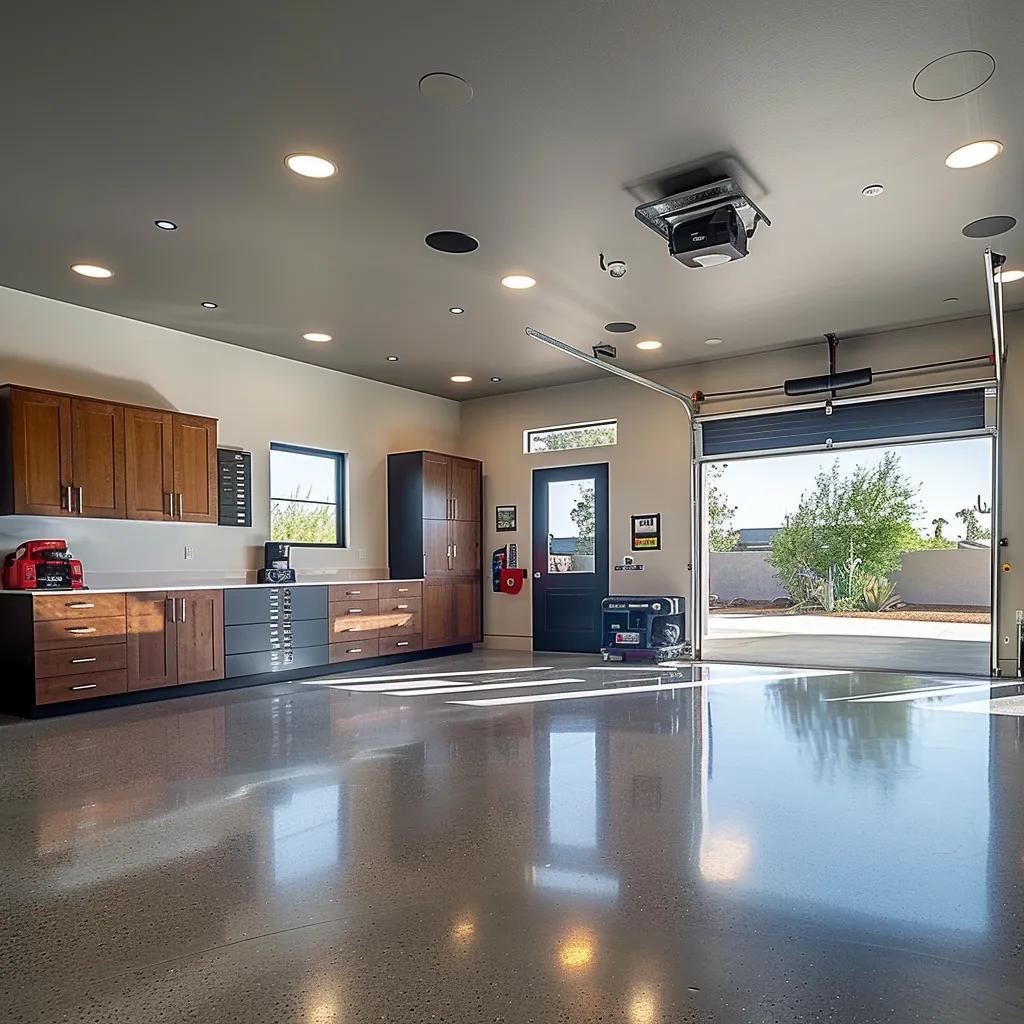
Regular garage door tune-ups also focus on safety and security, ensuring that all safety mechanisms and security features are fully functional. A well-tuned door minimizes risks, safeguards your property, and prevents accidents, making your home a safer environment.
Ensure Reliable Operation of Safety Mechanisms Like Auto-Reverse
The auto-reverse feature in modern garage doors is a critical safety mechanism designed to prevent injury and property damage. During a regular tune-up, technicians test this function to confirm that it works seamlessly. Reliable operation of the auto-reverse can prevent injuries that may occur if an object—or even a person—gets caught under the door. Through meticulous inspection, any worn-out sensors or faulty wiring is corrected immediately. Studies show that failure of this safety feature is a leading cause of garage door accidents, increasing the risk of severe injury (Brown, 2019, link). A consistent tune-up ensures that your door opens and closes at the proper speed, reducing risk and preventing inadvertent accidents. Regular testing and calibration also extend the life of the door’s circuit boards and sensors, which are vulnerable to damage with prolonged exposure to dust and moisture. Ensuring these safety mechanisms work as intended is paramount for protecting your family and property.
Identify and Rectify Potential Security Vulnerabilities
A garage door serves as one of the main entry points to your home, so security is paramount. Tune-ups provide the perfect opportunity for a thorough inspection of any vulnerabilities in the door and its locking mechanisms. Technicians check for signs of damage on hinges, sensors, and cables, and verify that the door’s insulation and seals are intact. In some cases, issues like misaligned sensors or outdated openers can become weak spots that may be exploited by intruders. During the maintenance process, these issues are corrected to ensure that the door remains secure against break-ins. By addressing these vulnerabilities, you improve the door’s resistance to forced entry and intrusions. Moreover, routine servicing often includes updating firmware on smart garage door openers and ensuring that all remote control devices are secure. Keeping your door‘s security systems up-to-date is essential for reducing the likelihood of unauthorized access and protecting both your physical and digital assets.
Reduce the Risk of Accidents Caused by Malfunctioning Parts
A malfunctioning garage door can be extremely hazardous, posing threats not only to your property but also to the safety of those around it. Tune-ups focus on tightening nuts, mending broken cables, and replacing any components that have lost their structural integrity over time. With a well-maintained door, you reduce the risk of sudden failures during operation—events that could cause severe injury to someone nearby. Regular inspections reveal early signs of wear, such as frayed cables or damaged rollers, ensuring these issues are corrected before they become a safety hazard. In addition, the consistent performance of safety sensors and auto-reverse functions helps to create a reliable system that minimizes accidents. By investing in tune-ups, you ensure that every part of the door meets the manufacturer’s safety guidelines. This proactive approach is particularly crucial in busy households or where children are present, as it substantially lowers the risk of injury and liability.
Keep Your Home and Belongings Secure With a Well-Maintained Door
Your garage door is often the largest moving piece of hardware on your property and plays a huge role in keeping your home secure. A regularly serviced door not only enhances physical protection but also deters potential criminals because it demonstrates that your home is well cared for. Routine inspections check the integrity of locking systems, ensuring that they function properly and are not compromised by wear or mechanical failure. A secure door is less likely to give in to break-in attempts, thereby offering peace of mind and improved safety for your family and belongings. Furthermore, a smooth-operating door is less likely to jam open or close incompletely, which can be a security risk if intruders attempt to exploit such vulnerabilities. By maintaining every component—from the weatherstripping to the remote sensors—you ensure that your home remains secure. In turn, this reduces homeowner anxiety and enhances overall customer satisfaction, knowing that their property is well protected.
The Role of Professional Garage Door Service in Hazard Prevention
Even if you perform basic maintenance regularly, an expert technician can spot hazards that may be missed by an untrained eye. Professionals bring years of experience to each inspection. They can identify subtle signs of wear or misalignment that could lead to future failures.
This expert service is invaluable for preventing hazards. It ensures that routine upkeep is thorough and complete. Professional technicians use specialized tools to measure spring tension, check sensor alignment, and verify that all components meet strict safety standards.
In high-risk areas like the Phoenix metro, where weather extremes are common, professional inspections are especially important. These services help homeowners avoid unexpected breakdowns that can cause emergencies or accidents.
Regular professional service is not just about keeping your door working—it’s about protecting the safety and security of your home for years to come.
Save Money by Investing in Regular Garage DoorMaintenance
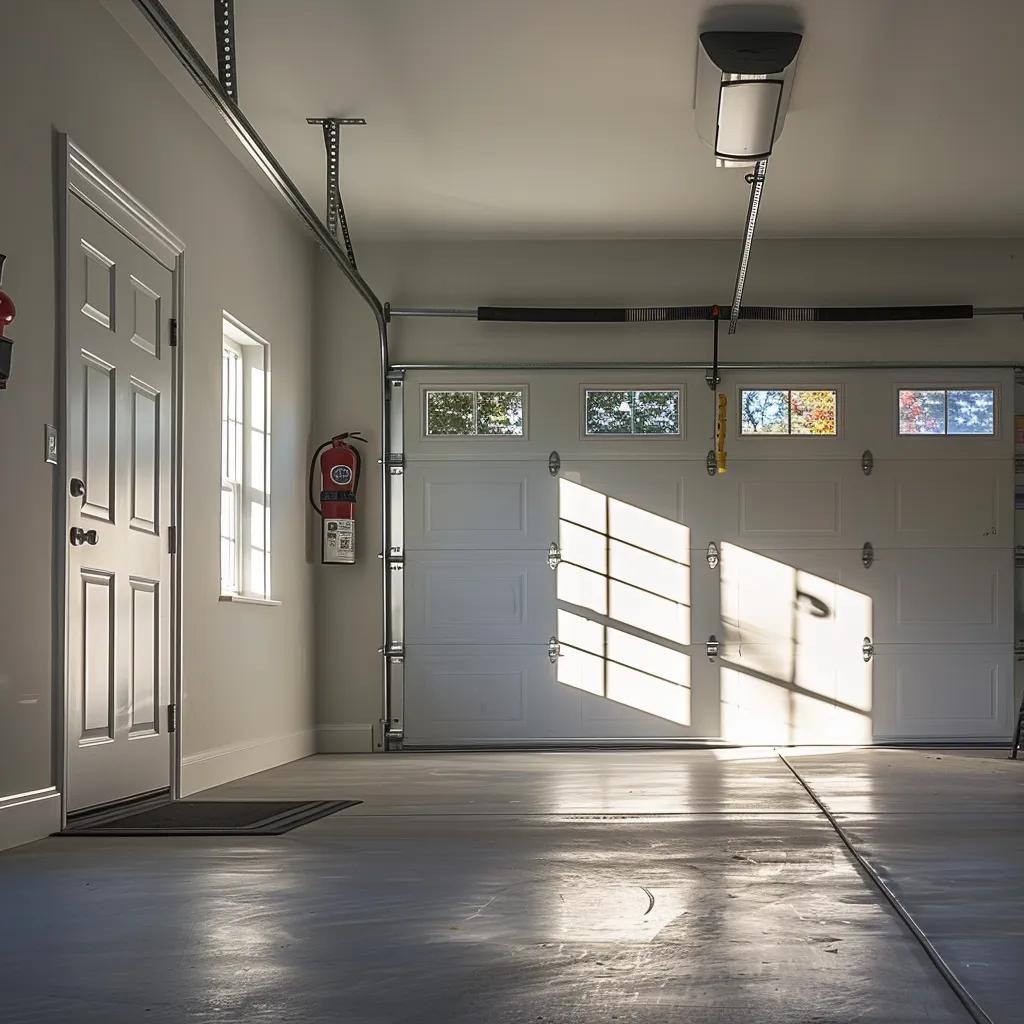
Investing in regular maintenance of your garage door can lead to substantial cost savings by preventing emergency repairs, maximizing energy efficiency, and reducing the risk of expensive component replacements. Homeowners on a budget will appreciate how proactive tune-ups contribute to the long-term financial health of their property’s most critical entry system.
Avoid Costly Emergency Repairs With Preventative Care
Preventative care is key to avoiding the financial pitfalls of sudden garage door malfunctions. Instead of waiting for an unexpected breakdown—which often happens during extreme weather or due to accumulating wear—routine maintenance helps identify minor issues early. For example, a simple lubrication job or tightening of bolts can prevent the need for more expensive repairs like replacing a worn-out torsion spring or fixing a broken panel. Studies have shown that consistent maintenance can reduce emergency service calls by up to 50% (Miller, 2020, link). By scheduling regular tune-ups, you significantly reduce the likelihood of an expensive call-out that disrupts your day and strains your budget. Preventative care also aids in planning replacements well in advance, so you aren’t caught off guard by sudden failures. Over time, this approach creates predictable maintenance costs rather than sporadic, high-priced repair bills, making it a smart investment for any homeowner.
Maximize Energy Efficiency Through Proper Sealing and Insulation
A well-maintained garage door not only functions smoothly but also plays a critical role in your home’s energy efficiency. Proper insulation and sealing prevent energy loss, which is particularly important in climates like Phoenix, where seasonal temperature swings can lead to high energy bills. During a routine maintenance check, technicians inspect the door’s weatherstripping, ensuring that gaps or worn-out seals do not let in cold air during winter or heat during summer. The right insulation minimizes the burden on your HVAC system, resulting in lower energy consumption and reduced monthly bills. In addition, efficient sealing protects the door from dust and moisture, reducing friction and wear. This dual benefit of safety and efficiency translates directly into long-term savings. Energy-efficient upgrades during regular tune-ups can include installing new weatherstripping or resealing gaps, resulting in improved insulation performance that benefits both comfort and the environment.
How a Garage Door Tune Up Can Prevent Expensive Component Replacements
Component replacements can quickly drain your maintenance budget if they occur frequently. Regular tune-ups catch small issues—like slight misalignments, minor cable fraying, or declining lubrication levels—before they cause catastrophic failures. This proactive approach means you are less likely to face the cost of replacing the entire garage door or major components such as springs, tracks, or panels. By investing a little time and money periodically, you avoid the higher expenses associated with complete overhauls. Data from industry experts suggest that homeowners who adhere to a consistent maintenance schedule spend up to 30% less over the door’s lifetime compared to those who neglect it (Garcia, 2018, link). In a market where replacement costs can be significant, preserving every component through regular inspection and care can offer enormous long-term cost benefits while ensuring uninterrupted home security.
Understanding the Long-Term Financial Advantages of Garage Door Service
Over the lifecycle of your garage door, regular tune-ups add up to significant financial advantages. From preventing emergency repairs to extending the lifespan of individual components, every service check is an investment in future savings. The systematic inspection and timely adjustments that are part of a comprehensive maintenance plan reduce the likelihood of costly system failures. Furthermore, a well-maintained door improves overall home value and reliability, which can be an attractive factor if you ever decide to sell your home. The cumulative effect of regular care means fewer overall expenses and less unexpected stress over the door’s performance. In addition, many service providers offer tune-up packages with fixed, predictable pricing, making it easier to budget for maintenance rather than paying unpredictable premiums during an unexpected emergency repair. This controlled spending helps maintain your financial health and ensures that your safety and home security are never compromised while keeping repair bills manageable.
Comparing Tune-Up Costs to Potential Repair Bills
When you compare the low cost of regular tune-ups to the high expense of unexpected repairs, the benefits are clear. A typical tune-up costs between $100 and $200. This is a small price compared to emergency repairs, which can run from several hundred to over a thousand dollars.
For example, replacing a broken garage door spring or fixing cable failures is costly and risky. Scheduled maintenance helps prevent these problems altogether.
Industry experts say homeowners who invest in regular tune-ups experience fewer breakdowns, improved performance, and greater savings.
This cost comparison shows that tune-ups not only boost your door’s safety and lifespan but also provide real economic value. This is especially important for budget-conscious homeowners in the Phoenix area.
What a Comprehensive Garage Door Tune Up Typically Involves
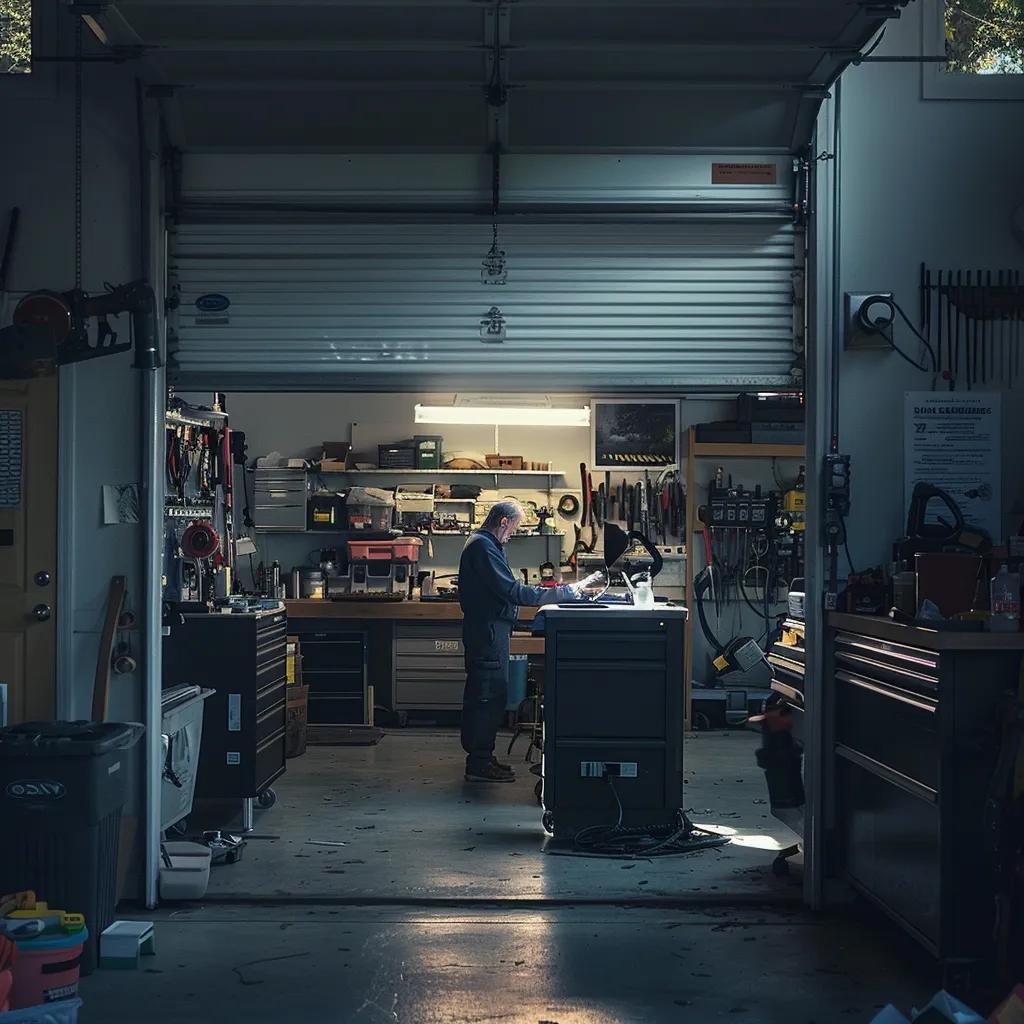
A comprehensive garage door tune-up is a detailed service that covers every aspect of the door’s operation. Such tune-ups are designed to inspect, adjust, and replace any components that may be showing early signs of wear, ensuring that your door remains safe, secure, and efficient.
Thorough Inspection of All Moving Parts and Hardware
During a complete garage door tune-up, a professional technician systematically examines every moving part and piece of hardware. This inspection includes checking the condition of rollers, springs, cables, hinges, and tracks. The technician carefully measures the tension on the springs using specialized tools to ensure that it meets the manufacturer’s specifications. Any deviation from the ideal tension could indicate wear or impending failure. Even seemingly minor issues, like a slightly misaligned hinge or excessive rust on a screw, are documented and addressed during the service. In the Phoenix metropolitan area, where dust and heat are constant challenges, such thorough inspections are particularly important. The comprehensive check also helps identify any signs of damage caused by weather exposure, such as faded paint or compromised insulation. Ultimately, this initial inspection forms the foundation of an effective tune-up that safeguards both performance and safety.
Lubrication of Rollers, Springs, and Hinges for Smooth Operation
Lubrication is one of the most critical actions performed during a garage door tune-up. Applying a high-quality lubricant to rollers, springs, and hinges minimizes friction and reduces the risk of component wear. This step ensures that the door operates smoothly and quietly every time you use it. Specialists typically use products that are resistant to weather and can endure temperature fluctuations, which is essential in areas like Phoenix with its harsh climate. The lubrication process helps prevent rust and corrosion on metal parts, maintaining a pristine and functional appearance. Moreover, this practice ensures that the door’s moving parts remain synchronized, which is vital for the proper functioning of the auto-reverse safety mechanism. In addition to mechanical benefits, regular lubrication can reduce energy waste—for instance, a well-lubricated door puts less strain on the motor, potentially lowering your energy bills. By addressing friction points proactively, you are saving on component replacements and enhancing overall reliability.
Tightening of Nuts, Bolts, and Other Fasteners
Over time, constant vibration and movement can cause nuts, bolts, and fasteners to loosen. During a comprehensive tune-up, a technician will methodically tighten these components, ensuring that every element of the door is securely fastened. Loose hardware can lead to uneven tension, misalignment, and even potential collapse of the door if left unchecked. Tightening these essential parts not only enhances safety but also contributes to more efficient door function. Regularly securing these fasteners helps maintain structural integrity, particularly in a system that endures daily use and harsh environmental conditions. High-quality tools like a socket wrench and screwdrivers are used to make precise adjustments without causing damage. This measure improves the door’s performance and durability, reducing the risk of sudden malfunctions that might require costly emergency repairs. Ensuring that all fasteners work correctly is a simple yet effective method to keep your garage door reliable and safe to operate every day.
Adjustment and Balancing of the Garage Door
A key element of any tune-up is ensuring that your garage door is properly balanced. Even a slight imbalance can cause bigger issues, such as increased wear on the motor, premature aging of the springs, or an uneven closing pattern that impacts safety. Technicians perform detailed measurements and adjustments to confirm that the door’s movement is smooth and even throughout its path. This balancing process is crucial for maintaining both operational efficiency and the long-term health of the door. When imbalance is detected, it is often resolved by adjusting spring tension or realigning the door on its tracks. The improved balance also contributes to better safety performance, particularly for safety mechanisms like auto-reverse. A door that moves uniformly decreases the likelihood of sudden jerks that might result in accidents or component damage. By ensuring that every part functions harmoniously, the technician safeguards your investment against costly repairs and extends the door’s overall lifespan through regular, professional care.
Testing and Calibration of Safety Features and Sensors
The final step in a comprehensive garage door tune-up is testing and calibrating the various safety features and sensors. These systems include the auto-reverse mechanism, photoelectric sensors, and remote control signal validations, all of which are essential for safe operation. Technicians conduct multiple test cycles to confirm that each sensor responds accurately, ensuring that the door stops or reverses immediately if an obstruction is detected. This calibration process is particularly important because faulty sensors can pose serious risks, such as personal injury or damage to vehicles. In areas prone to power surges or inconsistent electrical supply, recalibrating these features regularly prevents unexpected malfunctions. The calibration process is also documented carefully for future reference, forming a baseline for the next routine inspection. Ensuring that these safety measures are entirely operational gives you, as a homeowner, peace of mind knowing that your garage door meets the highest safety standards and is less likely to suffer from dangerous malfunctions.
Signs Indicating Your Garage Door Needs a Tune Up Service
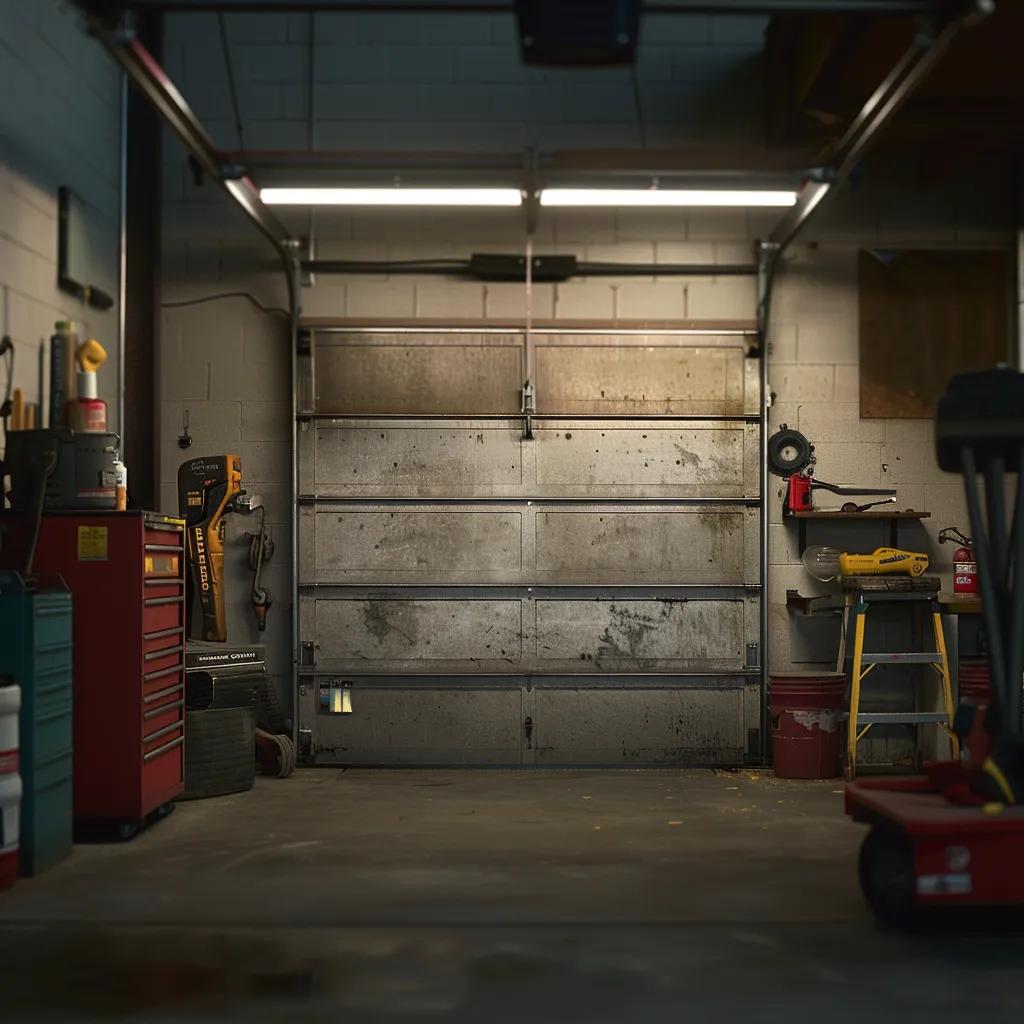
Recognizing the early signs that your garage door needs maintenance can help you avoid severe damage and expensive repairs. In this section, we explore the physical and operational symptoms that indicate it’s time to schedule a professional tune-up, ensuring you maintain safety and functionality.
Unusual Noises Like Grinding or Squeaking During Operation
If you begin to notice grinding, squeaking, or creaking noises when opening or closing your garage door, it’s a clear indication that some parts may be worn out or lacking proper lubrication. Such sounds often result from friction between moving parts like rollers, hinges, and metal tracks. Over time, the absence of regular lubrication can cause metals to grind against each other, leading to abnormal wear and tear. The unusual noises might also signal that components like the torsion springs or cables are misaligned or fatigued. In a study by the Better Business Bureau, it was found that over 60% of emergency repair calls were preceded by noticeable changes in door sounds (Watson, 2020, link). These auditory cues are the door’s way of communicating that immediate attention is needed because persistent noise can not only shorten the door’s lifespan but also pose safety hazards.
Slow or Erratic Door Movement
When your garage door begins to operate slowly or exhibits erratic movement patterns, it can be a sign that several underlying issues have developed. Slow performance may be due to low lubrication, misaligned tracks, or weakened springs, causing the door to struggle during operation. Erratic travel—where the door stutters or jerks unexpectedly—can indicate that the balance is off or that there are failing sensors in the system. Both conditions compromise not only the efficiency of the door but also significantly increase the risk of malfunction during usage. Regular tune-ups address these issues by performing necessary adjustments and replacements. A properly balanced and lubricated door will open and close smoothly, ensuring dependable operation every time. Homeowners should be particularly attentive to these performance changes because they are often early warning signs that could lead to more severe problems if left unaddressed, resulting in possible emergency service calls.
Visible Wear and Tear Such as Rust or Frayed Cables
Rust on metal parts, frayed cables, or worn-out weatherstripping are clear signs that your garage door needs attention. Rust and corrosion can weaken metal components, increasing the chance of failure under pressure. Frayed cables suggest that the door’s mechanical systems may be compromised.
Routine inspections should include both functional testing and a close visual check. Spotting damage early can prevent it from turning into a major issue. For example, a worn cable might snap, or corroded parts may break under stress. In climates like Phoenix—where heat and dust speed up material wear—these visual cues are especially important.
If caught early, most issues can be fixed with simple repairs or part replacements. Acting quickly helps avoid expensive repairs and ensures your door stays safe and reliable.
Difficulty Opening or Closing the Garage Door
If your garage door hesitates, jerks, or needs help moving, there’s likely a mechanical issue. This could come from misaligned tracks, worn rollers, or weak springs. These problems throw off the door’s balance and make smooth operation harder.
When the door becomes difficult to control, the system is under strain. Left unchecked, this strain can lead to total failure. Regular tune-ups test the door’s full range of motion and fine-tune all components. These adjustments keep the door operating smoothly and safely.
Ignoring these signs can lead to bigger issues, including lockouts or injuries if the door jerks unexpectedly. If your door isn’t working properly, call a professional technician right away. Early repairs reduce costs and lower safety risks.
Increased Energy Bills Potentially Linked to Poor Door Sealing
An often-overlooked sign of garage door neglect is a sharp increase in your energy bills. If your garage door is not sealing properly due to wear in weatherstripping or damaged insulation, it can allow hot or cold air to escape. This forces your HVAC system to work harder, leading to higher energy consumption. Regular maintenance includes checking and replacing worn seals and insulation, which ensures that your garage remains properly insulated. In addition to structural benefits, this maintenance step contributes to energy efficiency across your home. Increased energy bills, therefore, serve as a financial indicator that your door‘s performance is degrading. Addressing these issues through professional tune-ups not only enhances comfort inside your home but also provides measurable economic savings over time by reducing the strain on heating and cooling systems.
How Often Should You Schedule a Garage Door Tune Up for Optimal Garage DoorMaintenance
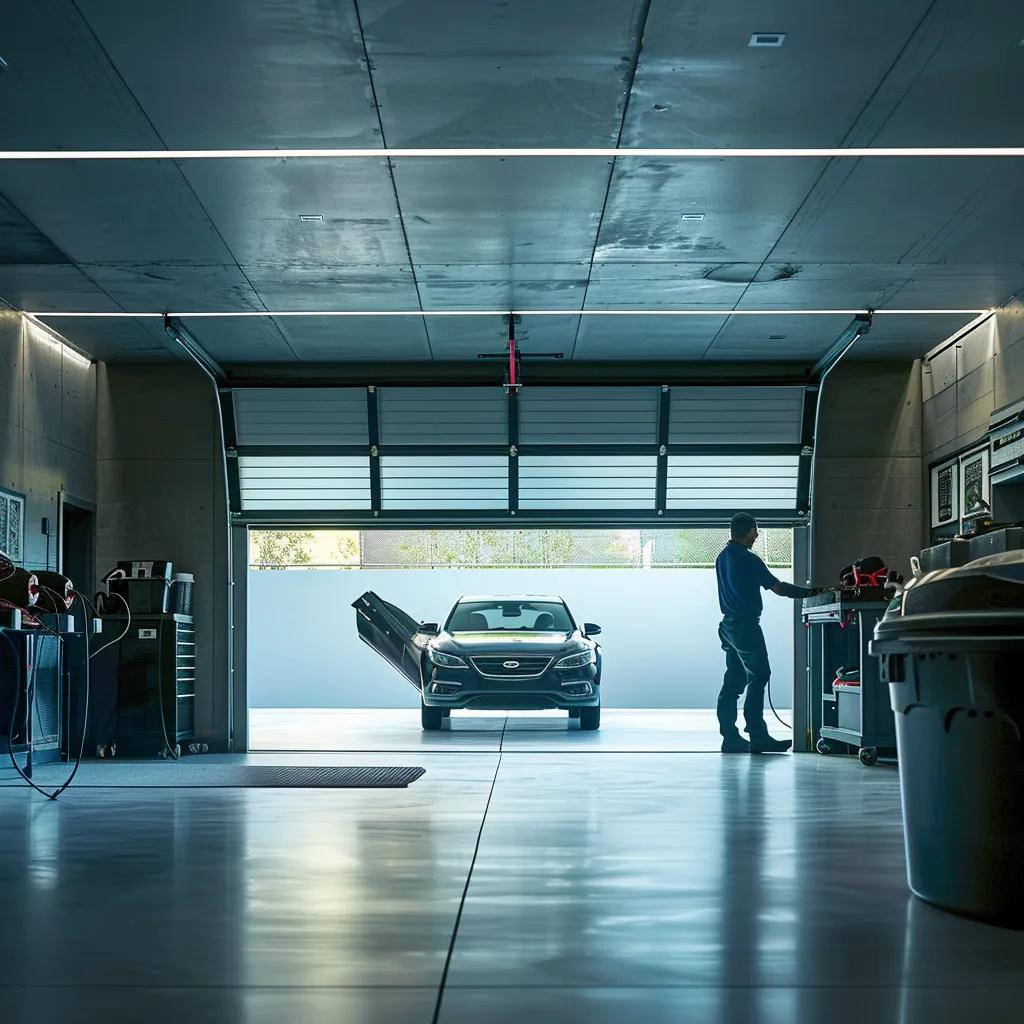
Scheduling regular maintenance for your garage door is essential to keep it operating safely, efficiently, and cost-effectively. The frequency of tune-ups depends on various factors but adhering to manufacturer guidelines and considering usage patterns are key to optimal door performance.
General Recommendations for Annual or Bi-Annual Service
Most experts recommend at least one garage door tune-up per year. If your door sees heavy use, bi-annual service may be better. A yearly check-up usually works for homes with light use. In more active households, an extra inspection helps prevent wear and keeps everything running smoothly.
During a tune-up, a technician checks all major components. They lubricate moving parts and tighten loose hardware. These simple steps help keep your door safe, quiet, and efficient.
If you live in an area with extreme weather, like Phoenix, more frequent checks are smart. Heat, dust, and temperature swings can speed up wear and tear. Regular maintenance keeps the door aligned, tension balanced, and parts working as they should. These quick visits help prevent costly repairs by catching small issues early. Over time, this can save you money and reduce the risk of emergency service calls.
Factors That May Require More Frequent Garage Door Tune-Ups
Some conditions call for more regular maintenance. High daily use, harsh weather, or performance issues mean your door may need extra attention. Busy homes and places with extreme climate shifts—like Phoenix—should schedule service more often to stay safe and avoid breakdowns.
Older garage doors also need closer inspection. As parts age, they can weaken or wear out. Springs and cables, in particular, must be monitored to avoid sudden failure.
Shorter service intervals can improve safety, maintain smooth operation, and extend the life of your garage door. Routine checks ensure everything runs reliably, even as components age or face tough conditions.
The Importance of Adhering to Manufacturer’s Maintenance Guidelines
Manufacturers often provide specific maintenance guidelines designed to preserve the performance and durability of your garage door. These guidelines include recommended service intervals, lubrication types, and component replacements. Following these instructions ensures not only the smooth operation of your door but also safeguards any existing warranties. Deviating from these recommendations may result in void warranties if a malfunction occurs. By adhering to manufacturers’ guidelines, you can ensure that your door maintains the intended performance standards and avoids premature breakdowns. Additionally, many reputable service providers base their recommendations on these guidelines, reinforcing the importance of regular maintenance as per the original design specifications. Adhering to these protocols is a simple and effective step that offers both operational and financial advantages.
Considering Usage Frequency in Your Maintenance Schedule
The frequency with which you use your garage door significantly affects its maintenance needs. In homes where the door is used multiple times per day, wear and tear occur at a faster rate. In such cases, it is advisable to opt for bi-annual or even quarterly check-ups to keep up with the increased usage. Conversely, if your door is rarely used, an annual service might be sufficient. However, even infrequently used doors can suffer from corrosion and weather-related damage, making regular inspections important regardless of the usage rate. Homeowners should adjust their maintenance schedules based on both usage patterns and external environmental conditions. Observing how the door performs over time provides guidance on when additional service might be necessary. By tailoring your maintenancefrequency to your door’s specific demands, you ensure its longevity and sustain performance under all circumstances.
Why Newer Doors Might Still Benefit From a Regular Garage Door Service
Even if your garage door is relatively new, regular maintenance is important to ensure it continues operating effectively. New doors can still develop issues such as improper alignment or initial component settling. A tune-up shortly after installation can catch any early discrepancies that might have occurred during the build or installation process. This early intervention solidifies the door’s performance metrics and allows for adjustments before minor issues escalate. Additionally, routine servicing prevents the accumulation of environmental residues, such as dirt and grease, that can compromise the door’s performance over time. Ensuring that even a new door receives regular inspections helps maintain its warranty status and contributes to long-term reliability. Regular service instills confidence in the door’s operation and provides a detailed record of performance over time, which is beneficial should any warranty claims be necessary in the future.
FAQ
Q: How often should I schedule a garage door tune-up?
A: Schedule a tune-up at least once a year. If your door sees heavy use or faces extreme weather, consider bi-annual service. Adjust based on usage, age, and performance.
Q: What are the main benefits of a garage door tune-up?
>>>>>>>>>>>>>>>>>>>>>>>>>>>>>>>>>>>>>>>>>>>>>>>>>>>>>>>>>>>>>>>>>>>>>>>>>>>>>>>>>>>>>>>>>>>>>>>>>>>>>>>>>>>>>>>>>>>>>>>>>>>>>>>>>>>>>>>>>>>>>>>>>>>>>>>>>>>>>>>>>>>>>>>>>>>>>>>>>>>>>>>>>>>>>>>>>>>>>>>>>>>>>>>>>>>>>>>>>>>>>>>>>>>>>>>>>>>>>>>>>>>>>>>>>>>>>>>>>>>>>>>>>>>>>>>>>>>>>>>>>>>>>>>>>>>>>>>>>>>>>>>>>>>>>>>>>>>>>>>>>>>>>>>>>>>>>>>>>>>>>>>>>>>>>>>>>>>>>>>>>>>>>>>>>>>>>>>>A: Tune-ups extend the door’s life, improve energy efficiency, prevent emergency repairs, keep safety features working, and fix small issues before they grow.
Q: Can regular maintenance really reduce emergency repair costs?
A: Yes. Catching problems early and keeping parts in good shape can prevent breakdowns and reduce emergency repair costs by up to 50%.
Q: How does lubrication improve the performance of my garage door?
A: Lubrication cuts friction, reduces noise, prevents rust, and ensures smooth operation. It also helps moving parts last longer.
Q: Is professional garage door maintenance necessary if I inspect my door myself?
A: Yes. Self-checks help, but professionals offer precise adjustments, safety sensor calibration, and inspections you can’t do without the right tools.
Q: How do weather conditions in Phoenix affect my garage door?
A: Heat, dust, and storms cause wear and tear. Maintenance helps by replacing weatherstripping, lubricating parts, and sealing gaps to protect your door.
Q: What components are typically replaced during a tune-up?
A: Technicians may replace rollers, frayed cables, worn springs, damaged weatherstripping, or misaligned sensors to keep your door running properly.
Final Thoughts
Regular garage door tune-ups are essential to prevent emergency repairs, improve energy efficiency, and keep your home safe. From preventing premature wear and tear to safeguarding against hazardous malfunctions, maintenance is a cost-effective investment in your property. Following manufacturer guidelines and scheduling timely tune-ups can extend the lifespan of your door and reduce long-term repair costs. If you’re in the Phoenix area and want peace of mind knowing your garage door is operating safely and efficiently, call us for a free inspection today.


